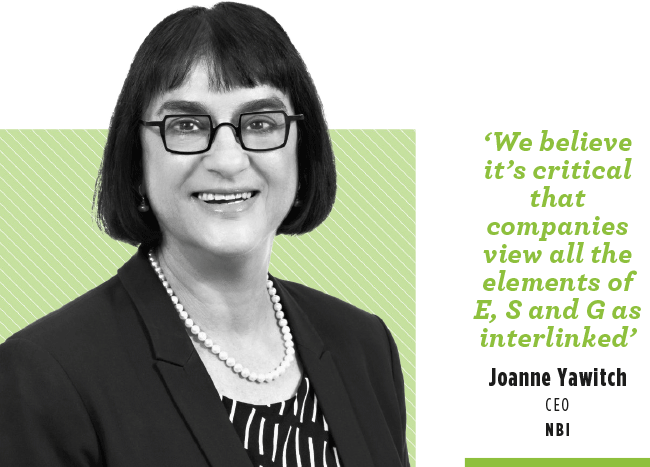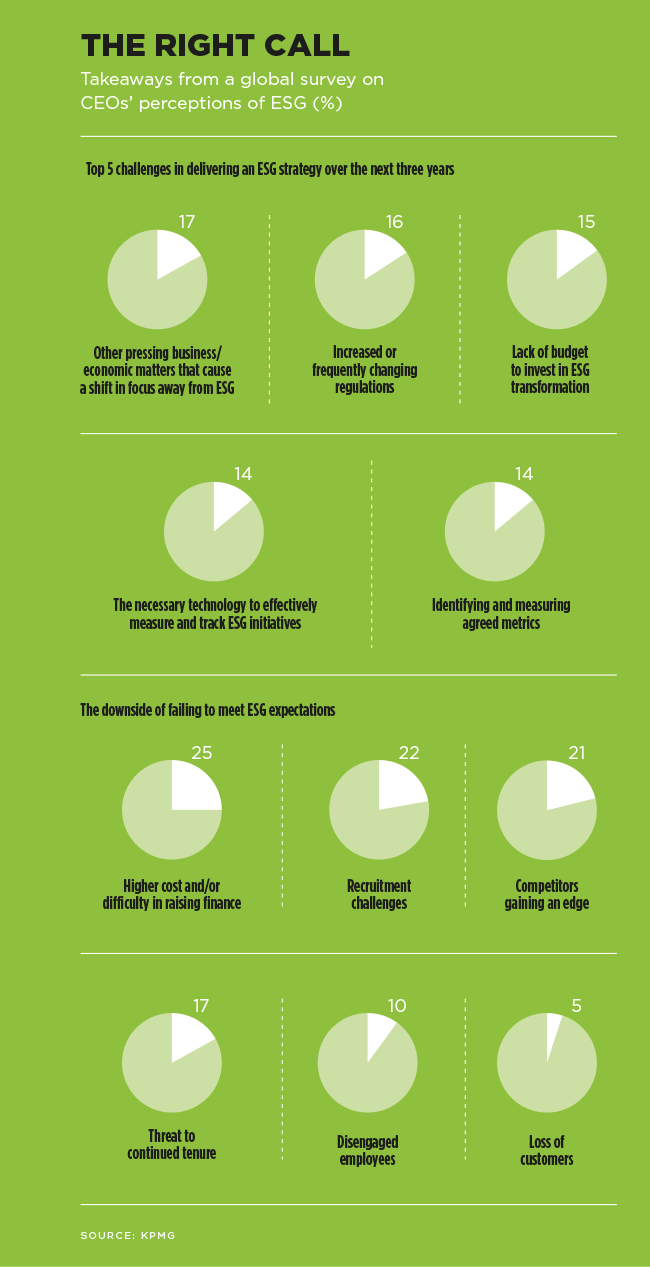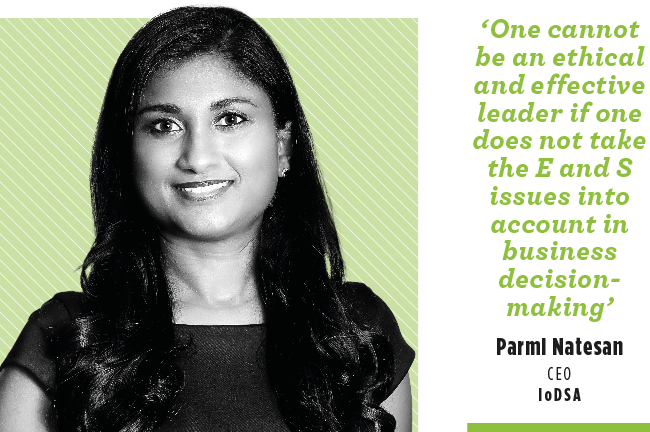In some areas of life you may get away with ‘faking it’. ESG, however, is not one of them. Companies might be able to fool others by overplaying their ESG credentials for a while, but in the long run this is likely to catch up with them. Considering sustainability is not static, companies need to continuously improve their ESG performance to maintain their social licence to operate and to thrive – rather than simply survive – in an uncertain, volatile and rapidly changing world. And there is a lot of money hinging on it too. Bloomberg Intelligence expects global ESG investing to reach $50 trillion by 2025, about one-third of the world’s total assets under management.
‘Corporate concerns with ESG are material in terms of the impact on economies, societies and communities,’ says Adrian Saville, economics professor at the Gordon School of Business Science and investment specialist at Genera Capital. ‘To put the importance of this at a headline level: if your country evaporates, the company goes with it.’ There are two crucial lessons in this.
One is the need to consider material ESG risks in the same way as a company would consider political, technological, climate-related or economic risks that are material to its operations. To illustrate ESG materiality, Saville refers to a US survey of 45 industries and six sectors covering almost 20 years. ‘What is interesting is that businesses that address material ESG issues perform substantially stronger than those that address immaterial, cosmetic ESG issues. This cautions against worrying about cosmetic issues, posturing or greenwashing because it wastes your time; while worrying about material ESG issues that really matter will overwhelmingly benefit your business performance.’
Secondly, there’s the issue of double materiality – a concept already adopted by the JSE Sustainability Disclosure Guidance and by EU regulations. Double materiality implies that a company doesn’t only consider the impact of ESG risk on its profits (‘outside in’), but also how its operations affect the people and planet around them (‘inside out’).
‘Externalities such as a company’s greenhouse gas emissions, effects on labour markets, and consequences for supplier health and safety are becoming an urgent challenge in our interconnected world,’ according to McKinsey & Co. ‘Many companies are moving aggressively to reallocate resources and operate differently; nearly all are feeling intense pressure to change.
‘Even before the Ukraine war-induced dramatic company action, the pandemic had prompted companies to reconsider and change core business operations. Many have embarked on a similar path with respect to climate change. This pressure is an expression of social licence – and it has been made more pressing as rising externalities have become more urgent.’
On the local front, Joanne Yawitch, CEO of the National Business Initiative (NBI), echoes this finding. ‘The drive for enhanced ESG action is encouraging companies to increasingly think and act beyond the factory fence, in their value chain and surrounding areas,’ she says. We see this trend to collaborate for mutual gain only increasing over time.’ NBI member companies have, for example, been involved in the CEO Water Mandate, a partnership to support corporate action on water; and more recently, in the Business for South Africa (B4SA) alliance to mobilise business resources and capacity to combat the COVID pandemic.
With the sharpened focus on ESG come scrutiny and a drive to crack down on greenwashing (making misleading claims that over-exaggerate the environmental or social benefits of a product, service or the organisation itself). While it’s not (yet) a crime in SA, Reuters reports that Australia imposed the first corporate fine for greenwashing.
In October 2022, an energy company had to pay $34 600 for incorrectly stating that its electricity would be carbon-neutral and its gas-to-power project would have low emissions.
When talking about unethical ESG practices, there’s also greenwishing (setting ambitious targets far into the future without realistic planning on how to get there) and greenhushing (not making one’s ESG plans publicly available, particularly around aspects, such as climate change, that incur strong stakeholder pushback). Standardisation and regulation play a vital role in reducing the risk of greenwashing, greenwishing and greenhushing. Recent global efforts by standard setters to mainstream ESG have led to the establishment of the International Sustainability Standards Board in 2021 and to ESG guidances, such as the Global Reporting Initiative, becoming standard.
‘There’s a lot of global development around corporate reporting, and I have no doubt that things will move quite quickly. So yes, I do expect further developments in mandating sustainability reporting,’ says Parmi Natesan, CEO of the Institute of Directors South Africa (IoDSA). She explains that, to some extent, sustainability (aka non-financial) reporting is already required for certain regulated industries. JSE-listed companies are required to apply the King IV Code, which already mentions integrated reporting that contains elements of the companies’ impact on the environment and on society.
Mandatory sustainability reporting is going to be a huge factor in the future of ESG, agrees Owen Skae, director at Rhodes Business School in Makhanda. ‘The biggest challenge will be developing and accessing the diversity of skills needed to do proper sustainability reporting. We just don’t have enough people, so there is great urgency to address this with the highest priority. Of course, I hope that business schools will make a fundamental contribution in developing the skills required.’ Natesan expects to see increased and clarified requirements for directors in terms of ESG reporting on the impact of companies as corporate citizens. ‘Related to that, audits of ESG information will become necessary,’ she says. ‘Corporates will be held more accountable for their impact on E and S.’
While in industrialised nations the ESG focus has typically been skewed towards the E, in SA – with its large inequality gap, poverty, unemployment and other social issues – it leant towards the S. This now seems to be balancing out, as the recognition grows that the socially just transition to a low-carbon economy will require tackling the full spectrum of ESG issues. ‘Given our context, we believe it’s critical that companies view all the elements of E, S and G as interlinked,’ says Yawitch. ‘For example, climate change affects the already marginalised and excluded, and will have far-reaching [effects] on gains we’ve made towards gender equity.’
Meanwhile Saville suggests that it may be worthwhile disaggregating E, S and G factors. Quoting a study by investment research firm MSCI, he says that ‘this interesting piece of research covers 12 years of market performance and found that when companies address the G, the E and S will follow. The suggestion is that when corporate governance is in order, the other factors tend to look after themselves. In other words, if we are truly concerned about how we conduct ourselves and how we behave, then the inference is that this will also manifest in S and E outcomes. So let’s ensure we get the G right.’
While the governance metrics in the JSE Sustainability Disclosure Guidance range from anti-corruption and remuneration, to board diversity and composition as well as tax transparency, there are some elements that are difficult to measure, such as business leaders having integrity and a moral compass (what the IoDSA calls ‘doing the right thing even when nobody is looking’).
‘For me, the term “governance” – defined as ethical and effectiveness in King IV – stands on its own,’ says Natesan, when asked where the G will fit into ESG in the near future. ‘One cannot be an ethical and effective leader if one does not take the E and S issues into account in business decision-making, as business is a corporate citizen on this planet – an influential corporate citizen that can have either a positive or negative impact on the E and S of ESG. Ethical, because it’s the right thing to do for the world around us in which we operate and thus need to nurture. Effective, because business relies on the E and S in order to operate, so it makes business sense as well.’
Skae also highlights good governance as a prerequisite for sustainability. ‘E, S and G are equally important, but without proper governance, the E and S are not going to happen,’ he says. ‘The question then becomes whether boards view this as a strategic opportunity to drive competitive advantage or as a grudge requirement, simply to be ticked to meet the bare minimum.’
Alarmingly, everybody in SA is directly or indirectly affected by the impacts of climate change and the country’s 35% unemployment rate. ‘These are material ESG risks that belong to all of us,’ says Saville. ‘Everyone should be worried a lot about this. And my cynicism says that if anyone is going to do anything about this, it’s the corporate sector.’
Ultimately, companies need to understand that ‘faking it’ by posturing and greenwashing won’t get them anywhere. Only those that address material ESG risk, paying specific attention to good governance, will improve the long-term sustainability of their operations – and deliver meaningful impact to the world around them.











